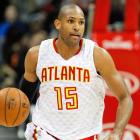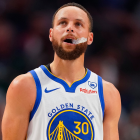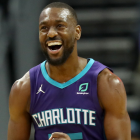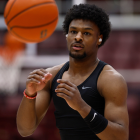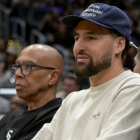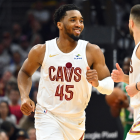The Atlanta Hawks' organization reached a low point in September 2014 when a 2012 email from Bruce Levenson to other members of the Atlanta Spirit ownership group, which included crude commentary on the in-arena production and predominantly African-American crowd that attended Hawks games, was leaked.
Ask Hawks CEO Steve Koonin about the email and he just shakes his head.
"He was wrong, on so many levels, and I don't want to refry those beans, but he was wrong," Koonin told CBS Sports earlier this season.
Shortly after the Levenson email became public, audio of racially charged comments made by then-GM Danny Ferry about Luol Deng from a meeting that summer was released. The organization was at a tipping point only months after former Clippers owner Donald Sterling was forced to sell his team following a video of a racist tirade surfaced.
Ferry was placed on indefinite leave prior to the 2014 season and eventually stepped down in the summer of 2015. Levenson and the Atlanta Spirit Group put the team up for sale and in April completed the sale of the team to a new ownership group led by Antony Ressler.
Koonin, the former Turner Entertainment Networks president, was named the Hawks CEO in April 2014. He had to oversee a massive shift in a Hawks rebrand that attempted to repair its relationship with fans in a city where 56 percent of the population is African-American.
Throughout the leadership change over the last year, Koonin and his staff guided the Hawks into an era that embraces Atlanta's hip-hop culture and tries to tap into that market as this organization never has.
"When [I went] digging into why our season ticket base is so small, I was told it is because we can't get 35-55 [year-old] white males and corporations to buy season tixs, and they are the primary demo for season tickets around the league."
This was one of the key points of Levenson's email to the ownership group. Levenson was grasping for ways to increase ticket and merchandise sales for a Hawks team that perennially finished near the bottom of the league in revenue.
Levenson wanted to try and attract middle-aged white males he felt were scared away by an in-arena product that he felt was geared toward African-American fans -- fans he felt couldn't or wouldn't pay premium pricing for concessions, merchandise and tickets.
"My theory is that the black crowd scared away the whites and there are simply not enough affluent black fans to build a signficant season ticket base," Levenson wrote in the email. "Please don't get me wrong. There was nothing threatening going on in the arena back then. I never felt uncomfortable, but I think southern whites simply were not comfortable being in an arena or at a bar where they were in the minority.
"On fan sites I would read comments about how dangerous it is around Philips [Arena] yet in our 9 years, I don't know of a mugging or even a pick-pocket incident. This was just racist garbage. When I hear some people saying the arena is in the wrong place I think it is code for there are too many blacks at the games."
Koonin has taken an opposite approach to what Levenson more or less suggested. Instead of pushing away more than half of the Atlanta population, he wants to bring in the younger, urban audience.
When discussing the Levenson email, Koonin explained that ignorance -- on a number of levels -- caused previous ownership to direct efforts in the wrong direction to make the organization financially viable.
"He didn't understand the marketplace," said Koonin. "The biggest mistake anyone can make is to make decisions without having the facts. And the facts of the matter are, Atlanta, Georgia, is 56 percent African-American. We're going to have a bigger than normal average opportunity with African-Americans, so embrace it! Love it!
"$1.7 trillion in spending power from the Atlanta market from African-American consumers. I'm open for business!
"So, again, I don't want to go backwards because we've made so much progress. If we're going to be successful, we have to know our customer as well as they know themselves. And we've spent a lot of time and money really understanding the customer. This wasn't in [young people's] consideration set, coming to a Hawks game, it is now."

As a former TV executive, Koonin sees the Hawks as an entertainment product and he wants to target the 18-34 demographic that is so coveted by TV, radio and other entertainment mediums. He wants Hawks games to have the feel of an entertainment product and be more than just a basketball game.
"Anybody who thinks sports is sports [is wrong]," said Koonin. " Sports is entertainment. You can't pull the two apart, it's like two sides of an oyster shell. They are together.
"The game is great, but this has to be a relevant part of your lifestyle. You can be the biggest NBA fan in the world and never come to a Hawks game. You can consume us through TV and video games, so to come here we have to be extraordinary and do things that constantly make us relevant.
"I just think it's something that, we changed who we were talking to. It's part of a much bigger strategy. I got in some trouble last year in an ESPN story when I said, 'The Alpharetta unicorn is not coming.' We are in downtown Atlanta, talking to your peers -- young professionals -- who love the NBA and are willing to spend money to come to a game, but they expect more than just a game. From our opening projection to our concert series to halftimes to everything we try to do, we want it to have a sense of entertainment. Coming out of the entertainment world, it comes a bit natural."
T.I. ran toward us
The Hawks have made a concerted effort to draw that audience with different events and promotions like an annual Tinder Night and a concert series that has exclusively featured Atlanta hip-hop artists.
The marketing theme has been "True to Atlanta." The concert series was an opportunity to connect with a city that has deep hip-hop roots and a seemingly unending supply of popular artists.
"We are blessed sitting in the cradle of southern hip-hop, and everyone who performs is a hometown hero," said Koonin. "It's not like we're buying talent and flying them here. These guys are authentic and true to Atlanta."
Atlanta rapper Jeezy performed at halftime and after the Hawks' Nov. 30 game against the Oklahoma City Thunder. Jeezy was the sixth rapper to take the court at Philips Arena since opening night of the 2014 season in a concert series -- T.I., 2Chainz, Ludacris, Rich Homie Quan and Big Grams (Big Boi and Phantograms collaboration) being the others -- and Silento and CeeLo Green became the seventh and eighth Atlanta-based rappers to take to the floor at Philips since Koonin took over.
The concert series began with T.I. at the 2014 opener, and it was a gamble taken by both sides following the Ferry and Levenson comments.
"T.I. ran towards us instead of away," said Koonin. "The trepidation was on my side, and T.I. ran towards us and then he and I made that unique commercial. That was a real important night, because opening night after having the situation that we did with the insensitive remarks, we didn't know if the audience was coming back. But we felt that with T.I.'s endorsement it said, 'Hey guys, it's cool.' It's cool to be a Hawks fan. And then it took off.
"He is somebody I will never forget and I will always be thankful for. I think T.I. understands redemption. He's had obstacles in his life he's had to overcome, and I think he was willing to forgive and to help. I think that changed a lot of things around here. I think we'll look back 10 years from now and say 'that guy should have a banner hung here.' That was a big night."
That night confirmed to the organization that they can still connect with that audience despite the damage done by Levenson's and Ferry's comments that came to light over the summer.
Jeezy, who spoke prior to his performance in November, echoed those sentiments when asked about the relationship between the team and the Atlanta community since the summer of 2014.
"I'm not very familiar with [the Levenson/Ferry situation], but I can tell you as a representative of the city and as a resident that life goes on," said Jeezy. "We continue to play ball and make music and it didn't really stop us. I think we rebounded and are back stronger than ever."
For Jeezy, the performances are bigger than just bringing hip-hop and the Hawks together. It was about making the city proud of being Atlanta, with the team and artists acting as representatives of the city.
"I think it's more than just hip-hop," Jeezy said. "I think what we got going on is, when you come to Atlanta it's a melting pot of everything. So, when you bring it all together -- I don't think it's just about us as hip-hop artists and them as athletes -- it's about the city. You know, when they come and they're tailgating. When they come to the games, they're in Hawks uniforms and it's festive.
"It's one of the biggest things we have here, so it feels like it's our thing. And everybody is proud of their teams anywhere they're from, so I think it's more so about the people. When we make the music it's about the people and the city and when you hear the music it represents the people and the city. When you see the team, they represent the people and the city. So bringing it together just represents the city more."
Kids who don't want their father's team
Atlanta has often been criticized as a sports town. Many point to it being a transitive city that is home to very few natives, which makes it difficult to cultivate a loyal fan base. Atlanta fans are widely considered fair-weather, only showing up when a team is succeeding.
That's not necessarily unfair. There are a great deal of people living in the Atlanta metro area who aren't from the city and have affiliations to teams and cities elsewhere.
As Koonin sees it, there's an opportunity in what most see as a detriment -- and of course he had statistics to back up his ideas. For all of the middle-aged people who come from elsewhere, there are kids and young adults who have grown up here and don't have the same connection to other cities.
"There are a whole lot of kids who don't want their father's team," Koonin said. "They want their team. 2.1 million 18 to 44 year olds live in Atlanta. That's a very young town. That's a target-rich environment.
"So instead of trying to get the 54-year-old from Boston, who when you cut him bleeds green, who is never becoming a fan because he has economics, or you perceive he has economics, and can buy tickets and drinks or something. Go for his kids! Who grew up here and are saying, 'What about me?' And make them fans and they'll be fans for 30 or 40 years."
To that point, everything about the Hawks rebrand has gone beyond just the in-arena experience. Everything the organization is doing now is an effort to target a younger audience.
This summer, the Hawks unveiled new uniforms to mixed reviews. They are flashy, with designs and colors that are far from traditional. The drastic changes weren't made based on a hunch that kids were into Volt green and patterned jerseys.
The Hawks looked to college athletics and how programs like Oregon and Boise State were using unique uniform designs to build a brand that attracted recruits -- recruits that are 17 and 18 years old, the exact audience the organization is aggressively seeking out.
"One of the reasons for our uniforms and being out there was video games," said Koonin. "We did a lot of study. Nobody can pick Boise, Idaho out on a map, but everybody understands Boise State's brand and they have a very cool culture. Oregon and Boise State are in the Pacific Northwest, which has very few professional athletes, but why are kids playing out there? Because it's cool.
"So instead of judging what's cool to me, we spend a lot of time talking to young people and prototyping, looking and sharing all kinds of unique ideas. So while somebody might mock an Oregon uniform, we went and talked to the AD at Oregon. Kids come to play at Oregon for the uniforms. So we want kids in Dallas and Oregon picking our uniform when they play 2K, because they want to be a Hawk because of the way we look."
The changes in marketing efforts, although in their infancy, have worked to this point for the Hawks.
"Twenty-five percent of our season ticket base is 18-34 now," said Koonin. "We literally changed the audience in one year. I've never seen anything like it, to be honest with you. Nobody ever talked to [old ownership about marketing to the younger crowd]. We've been unabashed. Everyone is welcome here.
"We're not discriminating against the older crowd -- my friends! -- a lot of whom are season-ticket holders. We're just saying, you're the next generation. This is a very unique city. It's not a plug-and-play city."
We're not an isolation team
The turnaround has been dramatic. In 2013-14, only 15.6 percent of the Hawks' season ticket base was between the ages 18-35. In 2014-15 that jumped to 22.5 percent and in 2015-16 that climbed to the aforementioned 25.5 percent. The plan is working, and the new approach to basketball operations has certainly played its role -- as has the never-before-seen success by the Hawks in recent years.
The Hawks made their first trip to the Eastern Conference Finals in 2015 and sent four players to the All-Star game. In 2015-16, they finished fourth in the Eastern Conference, sent two players to the All-Star game and made it to the conference semis.
Marketing and branding changes can only do so much if the main product isn't something worth watching, but even the Hawks' basketball operations have taken a new approach to building a team that, fueled by market research, makes it a more desirable product than the Hawks' previous playoff teams.
"I've had a lot of people say to me, 'aw, you're doing really well because you're winning,'" said Koonin. "I'm quick to remind them that 4 years ago I think we won 54 games and in the place you could shoot a cannonball off.
It's the way Bud has brought this team, and being a consumer marketer I field a ton of research. Hard-working, authentic, teamwork -- while we get criticized for not having a superstar in some avenues of the press -- it is very celebrated that we're not an isolation team, that we're not about one player, but about a team and a unit. It has really permeated and resonated. We're a fun team to watch. We (take a lot of threes), and it's a very good brand of basketball. We hustle, we play hard and we play for each other, and I think that connects to what makes us a great city."
Koonin and the organization are betting that the recent success will continue into the future, and that the organization will be able to find sustained success financially -- something that has eluded the franchise -- and hold the fan base that they've worked so hard to reclaim.
"At the Mutombo [jersey retirement] game [against the Celtics], there wasn't a green jersey in sight," said Koonin. "When was the last time you saw that? It was the first time I've ever seen it. Ever.
"Now, they're coming for us. They're entertained by us, and they're cheering for us."
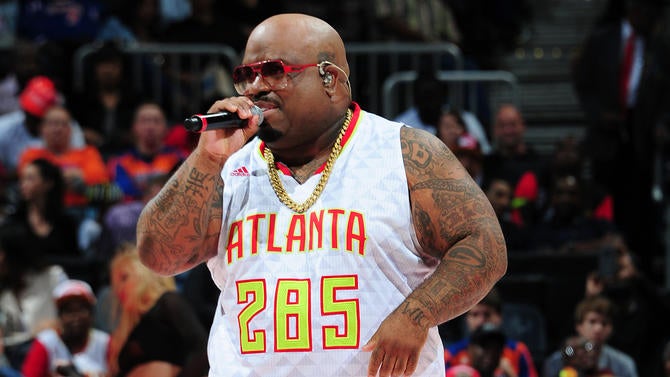
The challenge facing the Hawks this offseason, with Al Horford and Kent Bazemore as two key free agents and Jeff Teague being traded away prior to draft night, is to build a team that can keep the fans in Atlanta interested and in the building.
For those expecting a Hawks fire sale this offseason, with them letting Horford go without presenting a big offer and possibly trading the likes of Paul Millsap and others, don't hold your breath. This is an organization that has spent too much time and money the past two years to reclaim the fan base to go for a full rebuild, much less go in the tank -- you also have to factor in that coach Mike Budenholzer also serves as the Vice President of Basketball Operations and no coach is going to willfully build a team not ready to succeed on the court.
Atlanta fans are notorious for being late to games, if showing at all, and tend to leave the arena once the team begins to lose. It's why the Hawks are targeting the younger fan base and making game day an event larger than just a basketball game. Atlanta fans need to be entertained, and while the concerts and Tinder Nights and other events help, in the end, success on the court matters most and they are aware of that.
In order to sustain the success they've had in recent years and build on it, the Hawks must become a destination for free agents. NBA players love Atlanta. Many of them live in the city in the offseason, but the Hawks have never been a desired landing spot for big free agents.
This year they, like most every team, have plenty of cap space to acquire a high-priced free agent. After trading Teague and turning the point guard spot over to young Dennis Schroder, the Hawks can afford to offer Horford his five-year max and potentially give another max contract out, perhaps to a wing who would fill out a lineup with Schröder, Korver, Millsap and Horford, should they re-sign him.
The foundation, system and culture are in place after two years under Budenholzer. New ownership is hoping that the recent ground-breaking on a state-of-the-art training and practice facility can speed up the process of showing agents and players that they are committed to spending and doing what's necessary to win.
Come July, when free agency starts, we'll find out how much of that effort has resonated around the league. Atlanta has the money, but so does most everyone else. When money is equal, players will go to the place where they have the best chance to succeed both individually and as a team.
The Hawks have long been a playoff team desperate to take the next step into championship contention. Their ability to entice a big-time free agent to come to Atlanta this offseason will determine whether that next step comes in 2016-17 or if more patience will be asked of the organization and its fans.









